Broadberry CyberStore 316S-WSS review
Broadberry delivers the first Windows Storage Server 2012 appliance and we bring you the lowdown on Microsoft’s storage-centric OS.
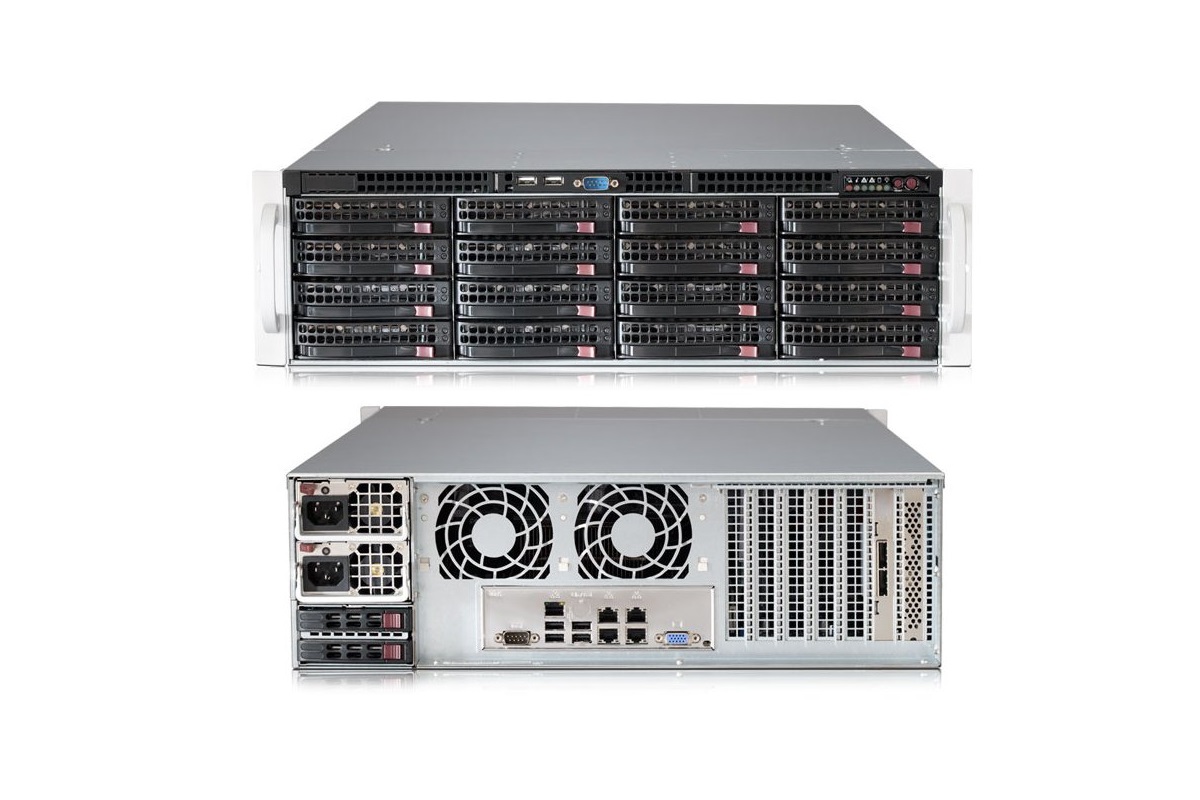

The CyberStore 316S WSS is a cost-effective network storage appliance built on a solid hardware platform offering a remarkable expansion potential. With the latest Windows Storage Server 2012 at the helm it delivers an impressive range of unified storage features and teams this up with high data reduction ratios.
-
+
WSS2012 Standard included, a unified storage solution, excellent value, high expansion potential, deduplication performs well
-
-
WSS2012 presents a steep learning curve.

Uptake for Microsoft's Windows Storage Server 2012 (WSS2012) has been slow with HP being the only blue chip to announce support with its new StoreEasy appliances. We've yet to see a review sample from HP making Broadberry Data Systems our first visitor to the lab with a WSS2012 production system.
The CyberStore 316S-WSS lays down a big gauntlet as this 3U all-Supermicro package delivers a base 24TB plus plenty of room to expand and all for less than seven grand. The price we've shown includes six 4TB WD Enterprise SAS drives and there room at the front for ten more.
They're managed by an LSI 9280-4i4e RAID card which supports 6Gb/sec SAS and SATA drives. It also has external ports for Broadberry's JBOD disk shelves allowing capacity to be boosted massively to 240 disks.
There's more as WSS2012 is loaded on pair of mirrored 256GB OCZ Vertex 4 SFF SSDs. These are hidden away at the back in hot-swap bays underneath the dual redundant power supplies and managed by the Supermicro X9DRi-F motherboard's own embedded SATA RAID controller.
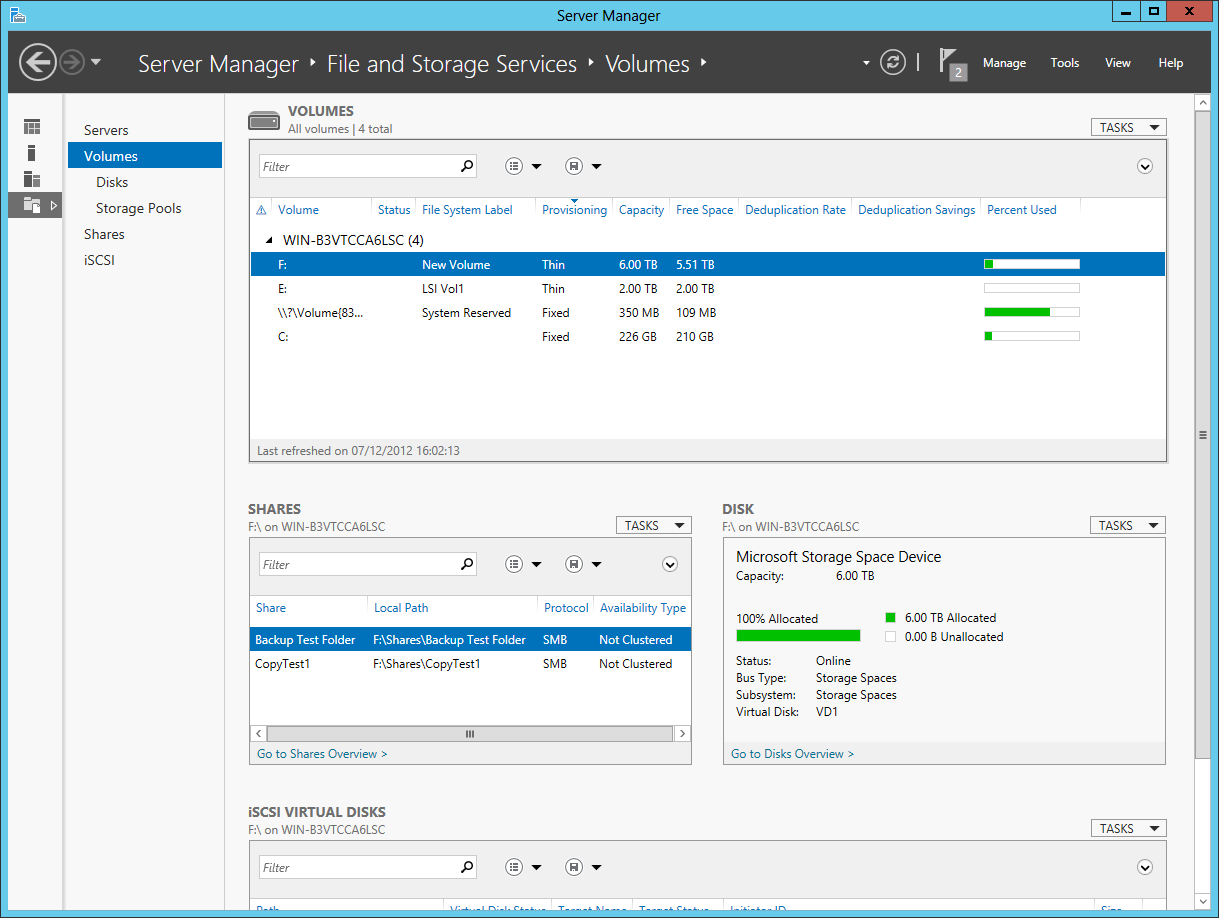
The new interface provides easy access to all key storage features in Windows Storage Server 2012
Windows Storage Server 2012 the lowdown
Unlike WSS2008, which didn't offer any major improvements over its predecessor, WSS2012 is full of new features. The CyberStore comes with WSS2012 Standard which has everything enabled.
You get block level deduplication, thin provisioning, NAS and IP SAN operations, storage spaces, SMBv3 and NFSv4.1 support and more. Value looks even better as it includes an unlimited capacity license, doesn't need CALs and to use the clustering/failover features, you just add the necessary hardware.
Sign up today and you will receive a free copy of our Future Focus 2025 report - the leading guidance on AI, cybersecurity and other IT challenges as per 700+ senior executives
The Workgroup edition is aimed at small appliances and has a number of limitations. It supports a single processor socket, 32GB of memory, up to six internal hard disks and fifty user connections.
As with Windows 8 and Server 2012, you'll have to get used to the Metro interface and Charms bar but once past these you can configure most storage features from the Server Manager interface. Selecting File and Storage Services takes you to menus for configuring disks, volumes, storage spaces, shares and iSCSI targets.
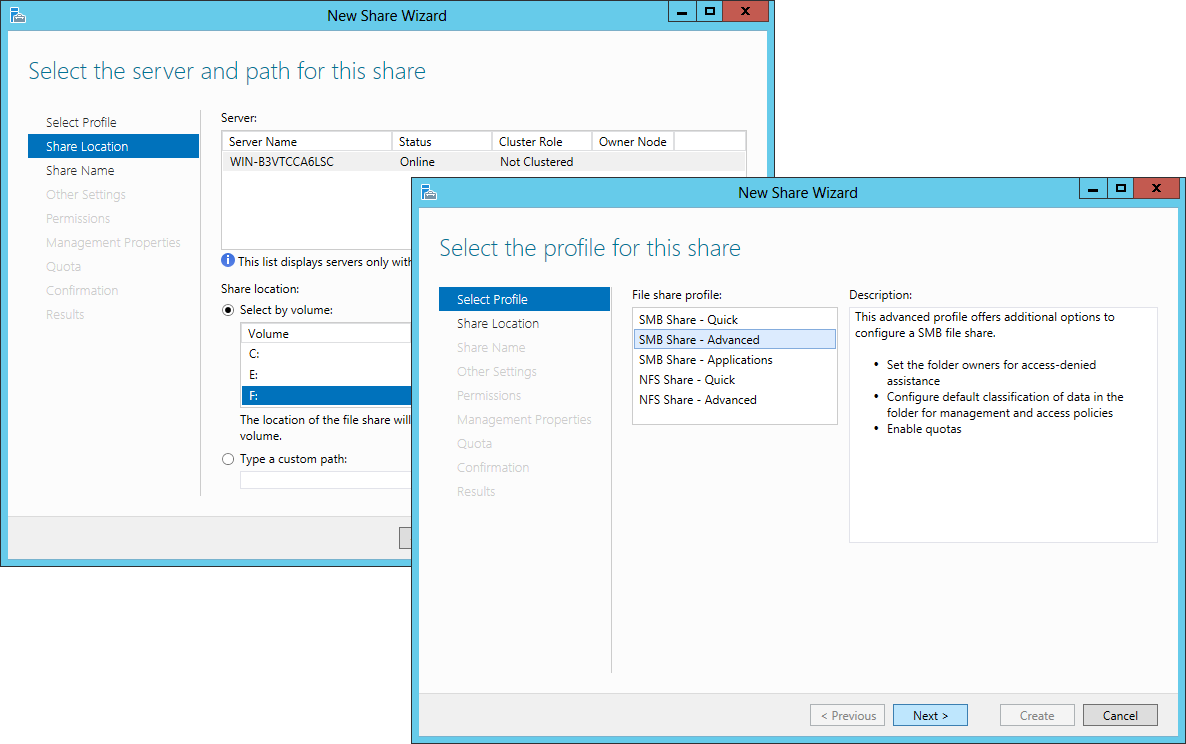
The network share wizard now has extra options for customising them ready for applications such as Hyper-V
Storage pools
Check out Storage Pools first as these enable a lot of important features. Physical disks of different sizes and from various manufacturers can be combined in a pool and used to create mirrored, striped or RAID-5 virtual volumes. Capacity can be expanded on the fly by selecting any available drive and adding it to the pool.
Microsoft's thin provisioning works directly with storage pools so applies equally to NAS shares and iSCSI targets created within them. When you create a virtual volume you decide on the RAID type you want and the virtual size which can be GB, TB and even PB.
For share creation, the wizard's Quick option can do most of the legwork for you. The Advanced option lets you set access permissions, select properties to be used for file classification and data management rules and apply a share level quota.
The Application option lets the wizard create shares with settings that suit Hyper-V or databases. Enabling the BranchCache feature for a share allows remote storage systems to cache files for faster local access and remote file connections can also be encrypted.
IP SANs are just as easy to create as you select a virtual volume and decide on a target name and size. The new WSS2012 access controls require initiators to be assigned to the target and you can view any that are already logged in.
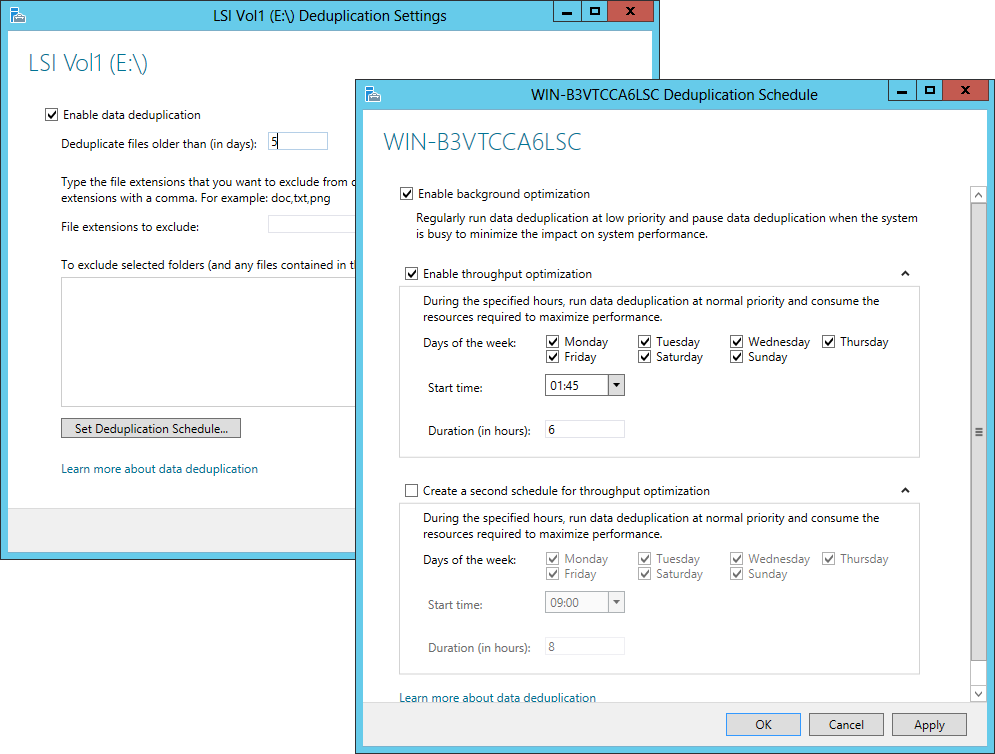
Deduplication runs in the background to a schedule and can be stopped automatically if system resources are in demand elsewhere
Deduplication performance
Deduplication is applied at the volume level where you set the number of days before a file is processed, any file exclusions and schedules. To test data reduction ratios we used the Binary Testing deduplication test suite and CA's ARCserve r16 configured to use a mapped share as a disk based backup device.
Using a 4GB data set of 1,000 files, we ran a standard backup strategy consisting of daily incrementals and weekly full backups. After the first full backup had completed, we fired up deduplication tasks manually from Windows PowerShell and then use the test suite to modify 2 per cent of data in 40 per cent of files prior to each subsequent backup.
At the end of a four week simulation we saw an impressive reduction ratio of nearly 7:1. This is close to ARCserve's own deduplication score and vastly superior to ZFS based storage appliances as our tests showed Netgear's ReadyDATA 5200 mustering a mere 3.05:1.
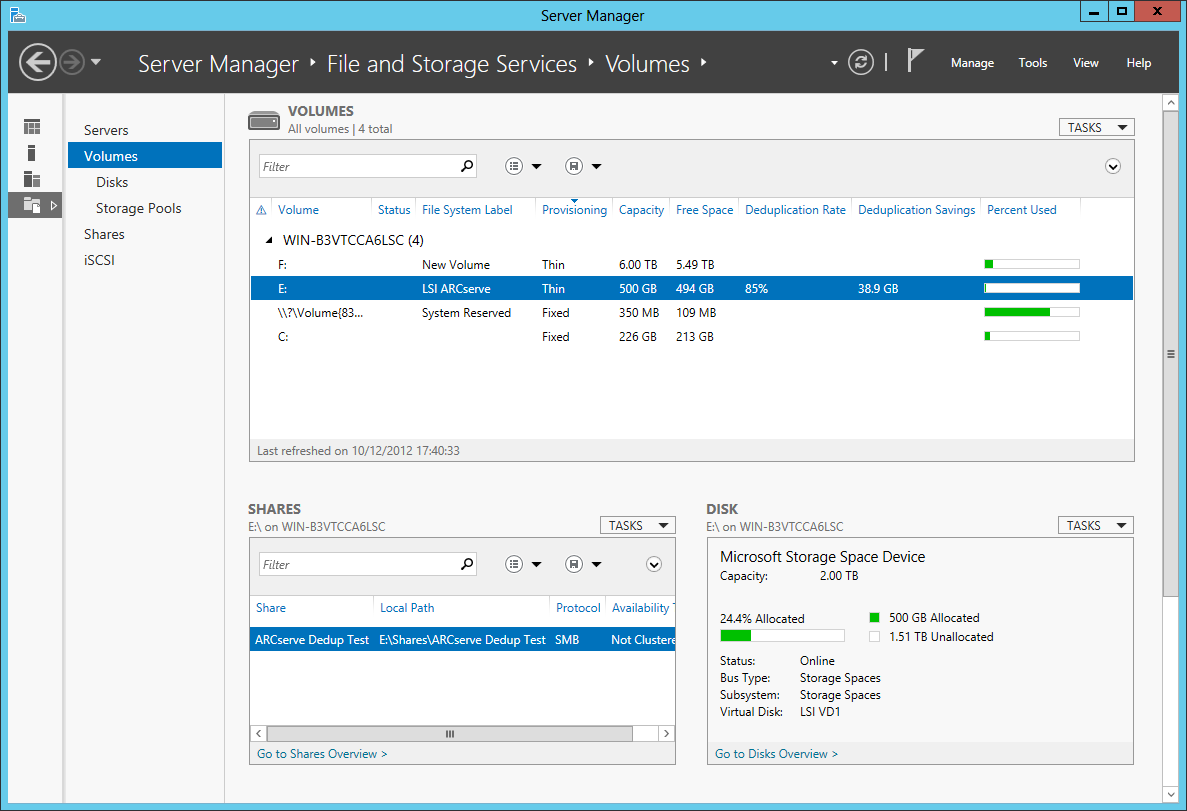
Results from our deduplication test suite show WSS2012 can deliver some big storage savings.
Conclusion
For the price, Broadberry is offering a tempting proposition as the CyberStore 316S-WSS is a well equipped storage server with masses of expansion potential. Its partnership with Microsoft's Windows Storage Server 2012 delivers an impressive range of new features and its deduplication delivers data reduction ratios that are far superior to the current crop of ZFS-based storage systems.
Verdict
The CyberStore 316S WSS is a cost-effective network storage appliance built on a solid hardware platform offering a remarkable expansion potential. With the latest Windows Storage Server 2012 at the helm it delivers an impressive range of unified storage features and teams this up with high data reduction ratios.
Chassis: Supermicro SuperChassis 836BE16-R920B 3U rack
Motherboard: Supermicro X9DRi-F
CPU: 2GHz Xeon E5-2620 (max. 2)
Memory: 32GB 1600MHz DDR3 (max 512GB)
Storage: 16 x hot-swap SAS/SATA drive bays
RAID: LSI SAS 9280-4i4e PCI-e with BBU
Array support: RAID0, 1, 5, 6, 10, 50, 60
Drive supplied: 6 x 4TB WD Enterprise SAS, 2 x 256GB OCZ Vertex 4 SSDs
Network: 2 x Gigabit
Power: 2 x 920W hot-plug supplies
Software: Windows Storage Server 2012 Standard pre-installed
Warranty: 3 year on-site NBD
Dave is an IT consultant and freelance journalist specialising in hands-on reviews of computer networking products covering all market sectors from small businesses to enterprises. Founder of Binary Testing Ltd – the UK’s premier independent network testing laboratory - Dave has over 45 years of experience in the IT industry.
Dave has produced many thousands of in-depth business networking product reviews from his lab which have been reproduced globally. Writing for ITPro and its sister title, PC Pro, he covers all areas of business IT infrastructure, including servers, storage, network security, data protection, cloud, infrastructure and services.
-
 Hackers are using LLMs to generate malicious JavaScript in real time – and they’re going after web browsers
Hackers are using LLMs to generate malicious JavaScript in real time – and they’re going after web browsersNews Defenders advised to use runtime behavioral analysis to detect and block malicious activity at the point of execution, directly within the browser
By Emma Woollacott Published
-
 AI coding is taking off in the US – but developers in another country are “catching up fast”
AI coding is taking off in the US – but developers in another country are “catching up fast”News Developers in the United States are leading the world in AI coding practices, at least for now
By Nicole Kobie Published
-
 Veeam ramps up growth plans with trio of leadership hires
Veeam ramps up growth plans with trio of leadership hiresNews The data resilience vendor has reshaped its senior leadership team to deepen partner engagement and streamline customer success in the AI era
By Daniel Todd Published
